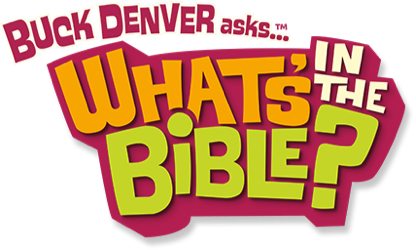
What is Easter all about? Easter can be a confusing holiday – stores are filled with chocolate eggs and stuffed bunnies, while churches teach about the death and resurrection of Jesus. Are the two connected? Not really. But even within the Christian celebration of Easter, there can be confusion, especially when explaining Easter to children. Different Christian traditions emphasize different parts of Holy Week – there are Palm Sunday, Maundy Thursday, Good Friday, and Resurrection Sunday services. How do all of those events come together to tell one story – the Holy Week? And even more, how do all of the stories of the Old Testament lead us to the Cross on Good Friday?
VeggieTales® and What’s in the Bible? creator Phil Vischer – along with Buck Denver & Friends! – explains.
What happened during Holy Week?
First, Jesus and his disciples went to Jerusalem to celebrate Passover, a Jewish holiday. Passover originated during the time of Israelite slavery in Egypt. God brought plagues to the Egyptians because they would not let the Israelites go free. The final plague was the death of all of the firstborn sons – but God warned the Israelites, and told them to sacrifice a lamb and put its blood on their doorways on that night. When the angel of death came to Egypt, the Israelites were saved. Understanding Passover leads us into a deeper understanding of Easter week, and the sacrifice Jesus made on the cross – he was the Passover lamb for all of us, saving us from death because of our sin.
When Jesus and his disciples entered Jerusalem, Jesus rode a donkey. Many people lined the roads and waved palm branches at him, saying “Hosanna!”. Today we remember this as Palm Sunday, and many churches celebrate it with special services.
Jesus and his disciples had a Passover meal together, and at this meal Jesus initiated the practice of communion. Today we call that meal the Last Supper, and some churches celebrate it with special services called Maundy Thursday. Other churches serve communion on Easter Sunday. Communion also reminds us of the sacrifice Jesus made on the cross, and we eat bread in remembrance of Christ’s broken body and drink wine in remembrance of the blood he shed for us.
After a trip to the garden of Gesthemane to pray for strength, Jesus was arrested when his disciple Judas betrayed him. He was put on trial, and sentenced to die for blasphemy – claiming to be equal to God. Jesus was killed on a cross, and when he died the whole sky went black and the temple curtain was ripped in two. Today, we remember Christ’s death on Good Friday.
But Christ didn’t stay dead, and as Phil explains in the video above, that is the real meaning of Easter.
What does Easter mean?
“The people around Jesus just saw a man dying on a cross. But that’s not what God saw,” Phil Vischer says in the Easter video. “God saw something very different happening … He saw the stain of our sin appearing on Jesus.”
When explaining Easter to children (or anyone), the emphasis must be more than just on the facts of the story. Easter means not only did Jesus die, but why he died – to pay for the sin that had plagued the world since Adam and Eve, and for the sin that continues to plague the world today. Easter also means that Jesus conquered death, and in doing so saved all of us from the eternal punishment of sin. As 1 Corinthians 15:54-55 puts it – “Death is swallowed up in victory. Oh death, where is your victory? Oh death, where is your sting?”
The power and mystery of Easter is embodied in the resurrection of the Christ, and the promised resurrection of all who believe in Him.
“Jesus proved that he had authority over death itself! That the power of sin and death was broken! That the kingdom of God was real, and that we can all be a part of it!” Vischer says in the video – and that’s the real meaning of Easter.
Pick up What’s in the Bible? Volume 10 today to learn – and feel – the story of Jesus.
Other stories and blog posts in this Easter series:
- How do you teach the Bible story of Jesus to kids?
- What happened between the old testament and the new testament?











